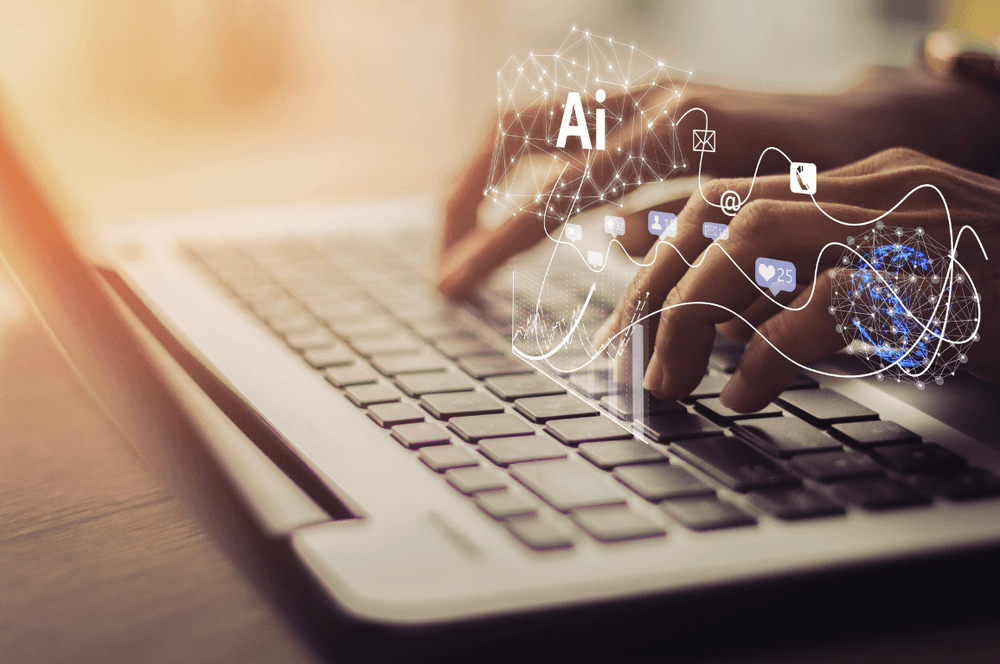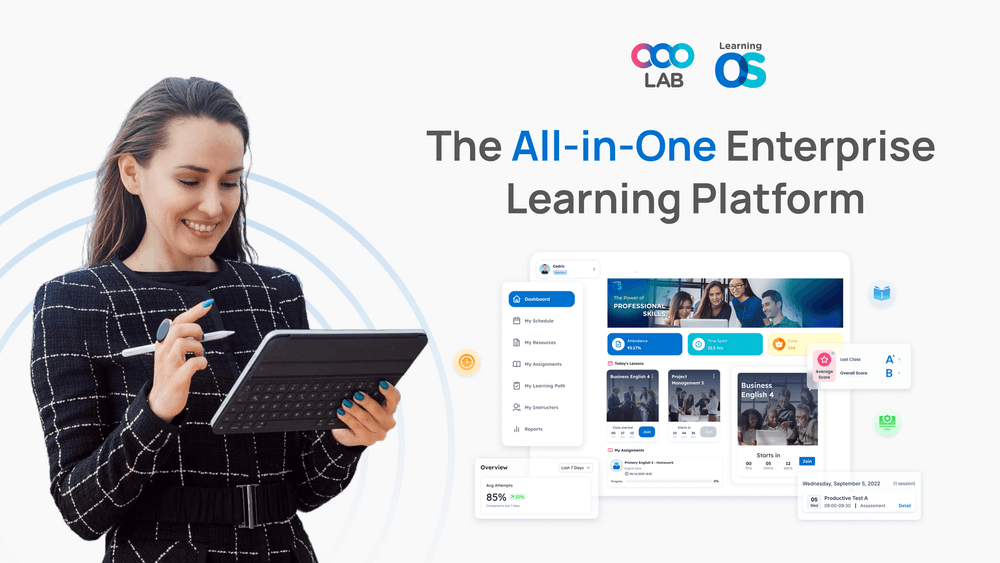

As learning and development becomes more critical to business success, organizations are re-evaluating the tools they use to train and upskill their workforce. Traditional Learning Management Systems (LMS) have long served as the backbone of corporate training—but they weren’t built for today’s fast-moving, data-driven work environments. Enter the AI-powered LMS: a smarter, more adaptive platform designed to personalize learning, automate delivery, and align training with real business outcomes. In this blog, we’ll explore how an AI LMS compares to a traditional one—and why the difference matters more than ever.
>>> Read more: AI is Transforming Corporate Training: Here's What You Need to Know
>>> Read more: The Future of AI LMS: Personalized Learning at Scale
Before distinguishing both platforms, a traditional LMS is widely-known as a centralized platform used to manage, deliver, and track training programs. It is effective for distributing standard content and maintaining compliance; however, it requires manual updates and oversight, which is often static.
An AI-powered LMS, on the other hand, leverages artificial intelligence to deliver smarter, more personalized learning experiences. It is designed for scalability and adaptability, allowing organizations to reduce even more manual administrative efforts and align training with evolving skill needs, compared to traditional ones. The details will be observed in the next sections.
 >>> Read more: How AI is Revolutionizing Learning Management Systems (LMS)
>>> Read more: How AI is Revolutionizing Learning Management Systems (LMS)
>>> Read more: How an AI-Powered LMS Enhances Employee Training and Performance
One of the most significant distinctions between a traditional LMS and an AI LMS is the level of automation it brings to the learning experience. In traditional systems, L&D teams often spend hours manually assigning courses, tracking completions, following up on non-compliance, and generating reports. These administrative tasks grow exponentially when training must be delivered across large, dispersed teams—such as onboarding hundreds of sales reps in different regions.
While an AI-powered LMS eliminates this burden through intelligent automation. From enrollment and content assignment to progress tracking and reminders, it streamlines every step of the process. For example, in sales training, AI can automatically assign role-specific modules based on region, product line, or experience level, and adjust pacing based on performance. This allows trainers to focus more on strategy and coaching, not administration.
Moreover, for compliance-heavy sectors, an AI LMS for compliance training ensures that learners are automatically alerted to upcoming deadlines, and that progress is tracked in real time—reducing risk and human error. When used for onboarding, AI-based training platforms can instantly tailor learning paths for new hires, ensuring consistency and speed without requiring manual setup. Therefore, organizations can realize a higher ROI in employee training.
>>> Read more: Sales Training for SaaS Companies: Overcoming Unique Challenges
>>> Read more: How to Measure ROI from Your Enterprise LMS
Traditional LMS platforms often rely on static, one-size-fits-all content that assumes all learners follow the same path—regardless of role, experience, or performance. This approach is especially limiting in dynamic environments like sales, where product lines, regional nuances, and customer challenges vary widely. It leads to inefficiencies, disengagement, and slower skill development.
An AI-powered LMS changes this by delivering highly personalized learning experiences. Using real-time data and behavioral analytics, it can customize content based on each employee’s role, past performance, learning style, and career goals. In sales training, this means reps in different regions or product categories receive tailored scenarios, objection-handling exercises, and pitch practice modules that reflect their unique customer landscape. The result is not just more relevant content—but better retention and faster application in real-world conversations.
Additionally, an AI LMS for onboarding ensures that each new hire receives only the most essential and role-specific information—avoiding cognitive overload and shortening ramp-up time. Over time, the system continues to adapt, recommending advanced content as reps grow and flagging skill gaps for targeted coaching.
Importantly, L&D professionals don’t need to worry that content variations will create knowledge gaps or increase workload. These personalized paths are guided by competency mapping and assessment metrics defined at the start of implementation. Organizations work closely with their AI LMS provider to ensure that personalization aligns with business goals, performance expectations, and compliance requirements. For those looking to explore how to implement personalization effectively, we’ve outlined best practices here.
>>> Read more: The Future of AI LMS: Personalized Learning at Scale
>>> Read more: Best Practices for Implementing a Learning & Development LMS
Traditional LMS platforms typically offer limited, static reporting—often showing basic metrics like course completions and test scores. While helpful, these reports are retrospective and require manual interpretation to identify performance gaps or learning trends. In fast-paced environments like sales, this lag in insight can delay intervention and reduce the overall effectiveness of training.
An AI-powered LMS, by contrast, provides real-time analytics that go far beyond completion rates. It continuously tracks learner behavior, engagement patterns, assessment results, and progress across skill areas. For sales teams, this means L&D leaders and managers can instantly identify who is struggling with key concepts—such as objection handling or product knowledge—and intervene with targeted support. These insights not only improve learning outcomes but also inform sales enablement strategies and performance coaching.
For organizations using an AI LMS for corporate training, real-time data transforms the role of L&D from reactive to strategic. It enables agile decision-making and faster adaptation to shifting business needs. And with integrations into broader HR systems, an AI-powered corporate LMS can contribute to workforce planning, succession tracking that meet the learning trends.

>>> Read more: Ensuring Sensitive Data Security in Your Enterprise LMS: Best Practices and Key Features
>>> Read more: Transforming Knowledge into Actionable Capabilities: The Role of Enterprise LMS
>>> Read more: Product Knowledge Training for Corporate Enterprises
Traditional LMS platforms tend to rely on reactive insights—only alerting L&D teams to issues after they’ve already surfaced. Whether it's low course completion rates or lagging assessment scores, these static indicators come too late to prevent knowledge gaps or underperformance. This lag is especially problematic in sales environments, where time-to-readiness and quota attainment are directly tied to business impact.
An AI LMS transforms this dynamic through predictive analytics. By continuously analyzing learner behavior, performance trends, and engagement data, the system can forecast outcomes—such as which new hires may struggle to hit onboarding milestones, who is likely to disengage, or which skills need reinforcement ahead of a product launch. This allows L&D professionals to act early, delivering personalized interventions and support before issues affect productivity.
These predictive capabilities make training more proactive and strategic, reducing ramp-up time and performance variability across the team. As a result, an AI LMS solution not only improves learning outcomes but also supports business agility by turning learning data into forward-looking action.
>>> Read more: Must-Have Features in an Enterprise LMS in 2025
>>> Read more: Customization Options for Enterprise LMS
Traditional LMS platforms typically rely on fixed curricula—predefined training tracks that apply broadly across roles or departments. While this approach may work for compliance basics, it often falls short when organizations need to address varied skill levels, evolving business needs, and diverse learner goals. It can leave (1) new hires overwhelmed, (2) senior employees underchallenged, and (3) high-potential talent without a clear path to grow.
An AI-powered LMS addresses this by offering scalable learning paths that adjust dynamically based on role, performance, and development goals.
For new hires, this means customized onboarding tracks that focus on immediate, job-specific competencies.
For senior employees, it enables continuous upskilling through advanced modules tailored to their experience and evolving responsibilities.
For identifying future leaders, the platform can surface performance insights, engagement trends, and skill mastery—allowing L&D teams to curate growth pathways that prepare emerging talent for leadership roles.
With an AI LMS for corporate training, organizations don’t need to choose between structure and flexibility. Each learner receives a development experience that is relevant, data-informed, and aligned with their trajectory within the company. This level of personalization—delivered at scale—supports both immediate performance and long-term workforce planning, making a scalable AI LMS solution a strategic asset for growing, future-ready enterprises.
 >>> Read more: Transforming Learning & Development: Discover LearningOS
>>> Read more: Transforming Learning & Development: Discover LearningOS
>>> Read more: How AI-Driven LMS Solutions Personalize Skill Development for Employees
>>> Read more: Strategies To Improve Team Skill Quotient
>>> Read more: A Game-Changer for Measuring and Boosting Skill Quotient
The differences between an AI-powered LMS and a traditional LMS are more than just technical—they create real, measurable impact across the organization. An AI LMS enhances the learning experience in ways that directly influence satisfaction, efficiency, and business performance.
For training to be effective, it must be engaging—and that starts with understanding how adults learn best. As Forbes highlights, adult learners thrive when content is self-directed, problem-centered, relevant to their roles, and applicable in real-life scenarios. An AI-powered LMS aligns naturally with these principles - helping employees stay motivated, retain information, and apply new skills with greater confidence.
The results speak for themselves. McKinsey’s research found that individualized learning pathways can boost engagement across all age groups by up to 60%, while increasing learning outcomes by 30%. Additionally, according to the LinkedIn Workplace Learning Report (2025), 90% of employees are more likely to stay at a company that invests in their growth, and 92% say that access to training positively impacts their engagement.
In short, learner satisfaction is no longer a soft metric—it’s a strategic outcome. With an AI LMS for corporate training, organizations can create learning experiences that not only educate but also inspire and retain top talent.
>>> Read more: Building Confidence in Your Sales Team Through Training and Development
>>> Read more: How AI is Enhancing Capability-Based Learning in LMS Platforms
Efficiency is a cornerstone of effective L&D strategy—especially when teams are dispersed, onboarding is frequent, and skill demands evolve quickly. Traditional LMS platforms often require significant manual effort; while an AI-powered LMS automates much of the operational overhead.
The efficiency gains are tangible. A recent study by MIT and Stanford University found that companies using AI assistants saw a 35% productivity boost among less experienced workers—a segment often requiring the most training support. Meanwhile, McKinsey research reports that organizations leveraging AI in L&D can achieve up to a 50% reduction in training and development costs by minimizing manual tasks and streamlining delivery workflows. For organizations investing in an AI LMS for employee training, the impact is clear: less time spent managing training logistics, and more time focused on strategic development initiatives.
>>> Read more: Measuring Training Effectiveness with an L&D LMS
>>> Read more: Employee Engagement Strategies for Your Enterprise LMS
While traditional LMS struggles to keep up with organizations growth across teams, departments, or global regions, an AI LMS addresses these challenges with scalable solutions. Whether you're onboarding 50 new hires or rolling out a product training module to thousands of sales reps worldwide, it ensures every learner receives content that’s timely, relevant, and aligned with business objectives.
AI also makes it easier to expand training beyond just onboarding and compliance. As employee roles evolve, the system continuously personalizes learning pathways—whether for upskilling senior talent or identifying potential leaders for succession planning. This ability to scale both horizontally (across teams) and vertically (through career stages).
The nature of work is evolving rapidly—and so are the demands placed on learning and development. According to the World Economic Forum, nearly 44% of core skills required for jobs today will change by 2028, driven by automation, green industries, and rapid technological advancements. As roles shift, both tech fluency and human skills—such as leadership, collaboration, and critical thinking—will rise sharply in importance.
Similarly, 83 million jobs are at risk of displacement, while 69 million new roles are expected to emerge. To keep up, organizations must adopt a skills-first, forward-looking approach to training. Therefore, an AI-powered corporate LMS plays a central role in this transformation.
Unlike traditional training systems, an AI LMS continuously adapts to emerging skill needs—mapping existing competencies, identifying gaps, and personalizing development plans accordingly. This adaptability allows companies to upskill employees for the future while supporting real-time needs across multiple regions.
Brandon Hall Group’s HR Outlook 2025 further highlights that workforce expectations are changing in tandem with work environments—especially with the rise of remote and hybrid models. Organizations are moving away from traditional, classroom-heavy training toward technology-enhanced, just-in-time learning. Microlearning, immersive tools, and AI-based training platforms are enabling this shift. Additionally, 43% of companies are actively supporting self-directed career growth, giving employees more control over their learning through curated content and personalized AI recommendations.
In this landscape, an AI LMS isn’t just a platform—it’s an adaptive infrastructure for talent development. By weaving learning into the flow of work and proactively responding to trends, it equips both employees and organizations to navigate uncertainty and lead in the future of work.

>>> Read more: Transforming Learning & Development: Discover LearningOS
>>> Read more: OOOLAB Achieves SOC 2 Type 2 Compliance, Reinforcing Its Commitment to Enterprise Security and Customer Trust
>>> Read more: Trends in AI-Powered Personalized Learnin
>>> Read more: AI Features That Improve Training Outcomes
The distinctions between traditional and AI-powered LMS platforms are more than functional—they’re foundational to how organizations prepare for the future of work. From automation, personalization, to real-time analytics, an AI LMS equips companies to deliver smarter, faster, and more adaptable training. As workforce expectations shift and skill needs evolve, scalable, data-driven learning systems will not just support growth—they’ll define competitive advantage.
Book a Free Demo with us. Bring your Training and Learning to a new height with LearningOS.
 >>> Read more: The Future of Enterprise LMS: Trends to Watch in 2025
>>> Read more: The Future of Enterprise LMS: Trends to Watch in 2025
>>> Read more: How Enterprise LMS Supports Continuous Learning in the Digital Age
>>> Read more: Sales Training in Healthcare: Addressing Compliance and Ethical Selling
>>> Read more: Effective Onboarding Strategies for New Sales Hires: Setting Them Up for Success
At OOOLAB (pronounced 'uːlæb'), our mission is to make complex learning operations simple. We aim to positively impact the lives of over 1,000,000 learners and educators by the end of 2026.
OOOLAB's LearningOS provides educational institutions and corporate enterprises with an all-in-one solution to create and deliver engaging learning experiences.
We meet organizations' needs or support your growth. We provide undivided attention. We provide:
Dedicated success manager: We offer direct communication with a real human who'll discuss your enterprises unique learning operations and goals.
Personalized setup: Our team will help you transition to LearningOS on your schedule, one step at a time.
Around the clock support: Get help from us any time, and in any time zone.
Reach out to us at: LinkedIn, Facebook, Instagram, Tiktok, X
1. What are the main benefits of LearningOS?
Our platform is easy to use and automates all aspects of your learning operations. It efficiently manages complex tasks, allowing you to concentrate on delivering exceptional learning experiences.
2. What main features does LearningOS offer?
Our all-in-one software solution combines a Content Management System, a Learning Management System, content authoring tools, and a mobile friendly Learner Portal.
3. Can your platform be used for corporate enterprises?
Absolutely! LearningOS is an Enterprise LMS that is a great fit for corporate learning. In fact, we have clients with up to 700,000 employees using LearningOS! Upskill your workforce by creating and assigning interactive eLearning content while effortlessly tracking employee progress.
4. Who currently uses your platform?
Our platform is currently used by over 120,000+ learners, parents, and employees across 21 countries worldwide!
5. What types of content options are available on your platform?
We offer ready-to-go curriculums for various educational purposes or our expert design team can build a custom course for you. We can also upload your existing learning materials and enhance them digitally.
6. What is unique about LearningOS?
Our platform, designed by educators for educators, provides you with all the tools you need to scale. Build and promote your own hybrid and blended learning courses and save money on licensing fees by owning your own proprietary content.
7. How can I get started?
Schedule a meeting with our experts and we’ll talk about how our platform can address your unique challenges and help to grow your business.